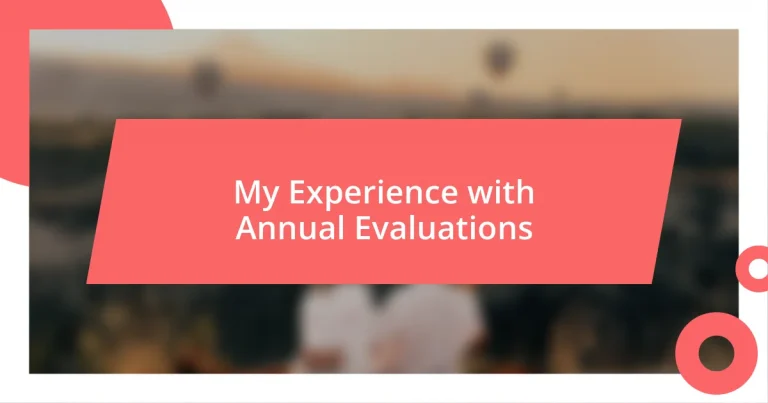Key takeaways:
- Annual evaluations provide an opportunity for self-reflection and future goal setting, helping employees gain insights into their strengths and areas for improvement.
- Preparation is crucial for successful evaluations; actively gathering feedback and practicing self-reflection lead to more productive discussions.
- Utilizing feedback from evaluations can drive career growth by prompting skill development, realigning goals, and uncovering hidden strengths.
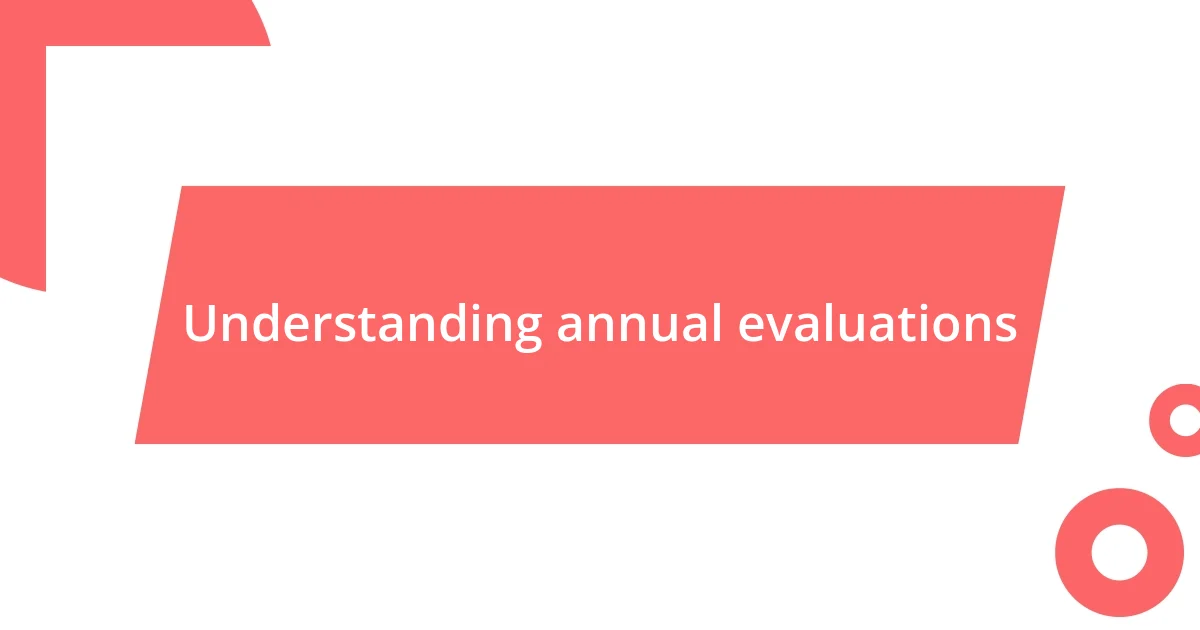
Understanding annual evaluations
Annual evaluations are a critical part of the workplace, providing an opportunity for employees and managers to reflect on the past year. I remember my first annual evaluation; I was both anxious and hopeful, wondering how my efforts would be recognized. It’s a time when feedback can feel like a double-edged sword; it can either bolster your confidence or highlight areas for improvement.
What I find fascinating is how these evaluations can also uncover unexpected strengths. During my evaluations, I often discovered skills I didn’t realize I possessed, like my knack for team leadership in high-pressure situations. Have you ever been surprised by the feedback you received in your own evaluation? It’s amazing how different perspectives can illuminate aspects of our work that we overlook ourselves.
Moreover, annual evaluations serve as a roadmap for future growth. They’re not just about what went well or poorly; they are a conversation starter about aspirations and development plans. I often look back at my goals set during those evaluations, and as I do, I feel a sense of accountability, making me more invested in my own professional journey.
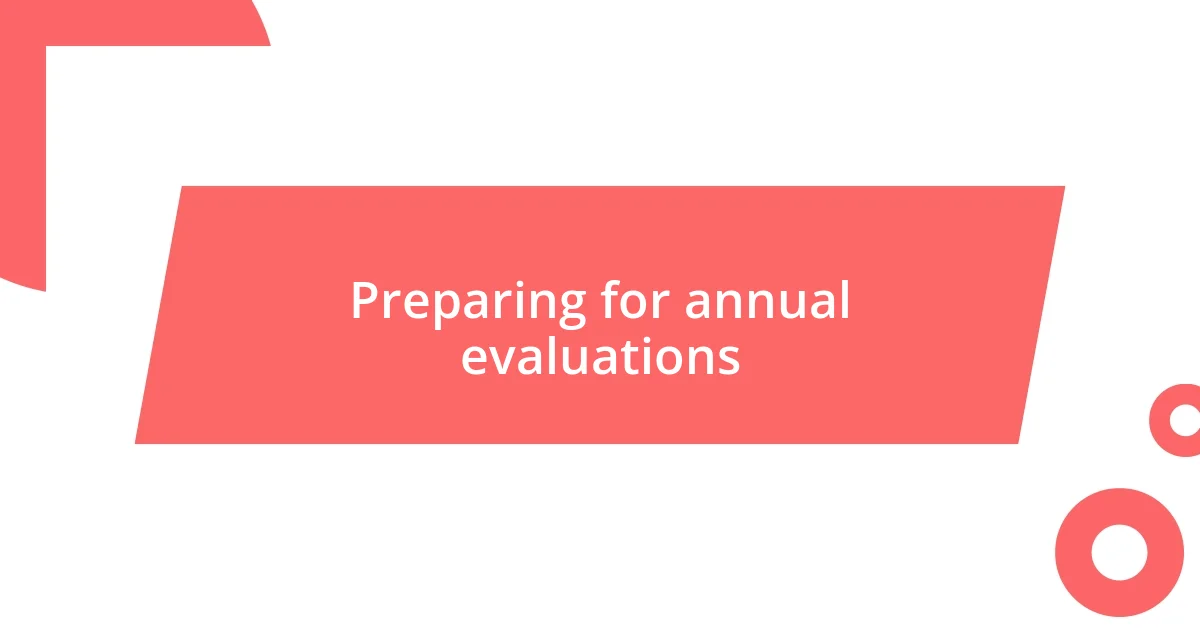
Preparing for annual evaluations
Preparing for annual evaluations can feel like gearing up for a big event. In my experience, taking time in advance to reflect on accomplishments and setbacks really sets the stage for a productive discussion. I often find that jotting down key achievements and areas of growth not only boosts my confidence but also prepares me to navigate any tough conversations.
To help you prepare effectively, here’s a checklist that I swear by:
- Review past evaluations: Look back at previous feedback and assess your progress.
- Set clear goals: Define what you want to achieve in your next evaluation, both short-term and long-term.
- Gather supporting documentation: Compile any emails, data, or project highlights that showcase your contributions.
- Practice self-reflection: Think about what you’ve learned this year and how you’ve evolved professionally.
- Identify challenges: Be honest about the hurdles you’ve faced and how you’ve addressed them.
I remember a time when I felt unprepared. I hastily jotted down points right before the meeting, and it showed. My evaluator noticed my nervousness, which made it harder to engage in meaningful dialogue. That experience taught me the importance of preparation; it’s truly an investment in your professional growth.
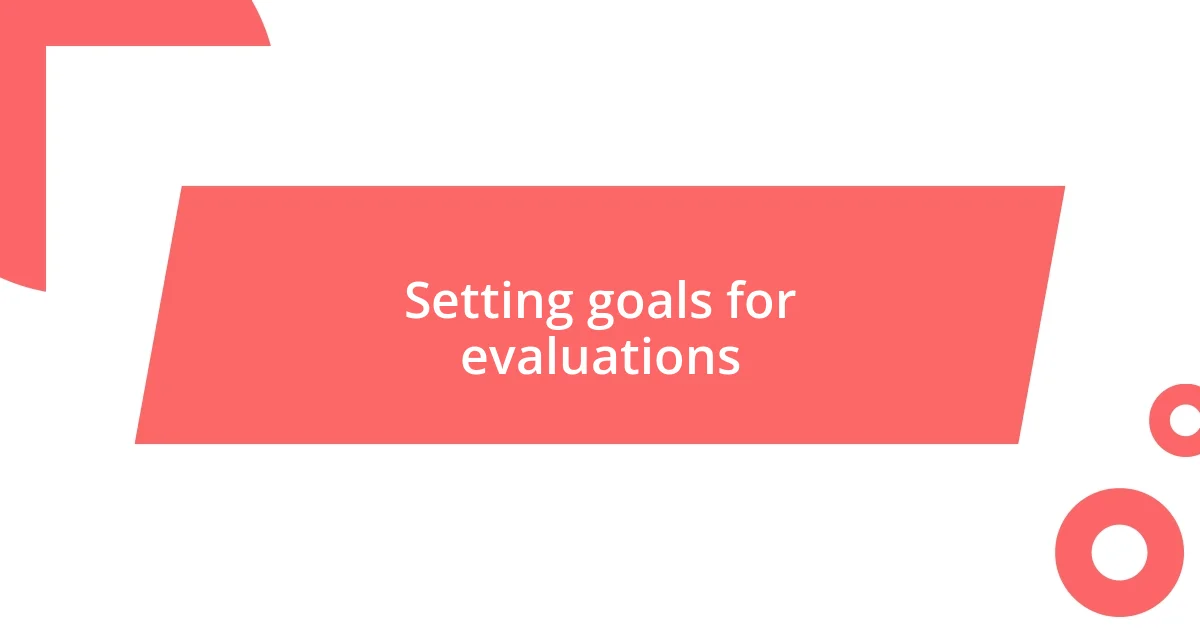
Setting goals for evaluations
Setting meaningful goals for annual evaluations is essential. When I set my goals, I always try to make them SMART—Specific, Measurable, Achievable, Relevant, and Time-bound. This framework not only gives clarity but also holds me accountable. I remember a year when I aimed to improve my project management skills; breaking that down into monthly milestones helped me stay focused and measure my progress along the way.
Goals should evolve as you gain experience and insights. I once set a goal to improve my communication skills based on feedback from my last evaluation. Throughout the year, I attended workshops and sought feedback from colleagues. By openly discussing my goal with my manager, I found that not only was I held accountable, but I also received valuable support and resources to help me achieve it.
Establishing a collaborative goal-setting approach can transform evaluations into a joint effort. I made a habit of discussing my goals with my supervisor regularly. It fostered a sense of partnership in my professional journey, and I felt more motivated to meet the expectations set. This partnership made evaluations less daunting and more of a shared experience aimed at growth.
| Goal Type | Description |
|---|---|
| Professional Development | Focus on skills and competencies that enhance your work performance. |
| Personal Growth | Includes soft skills like communication and teamwork that improve interactions. |
| Team Objectives | Align personal goals with team goals to foster collaboration. |
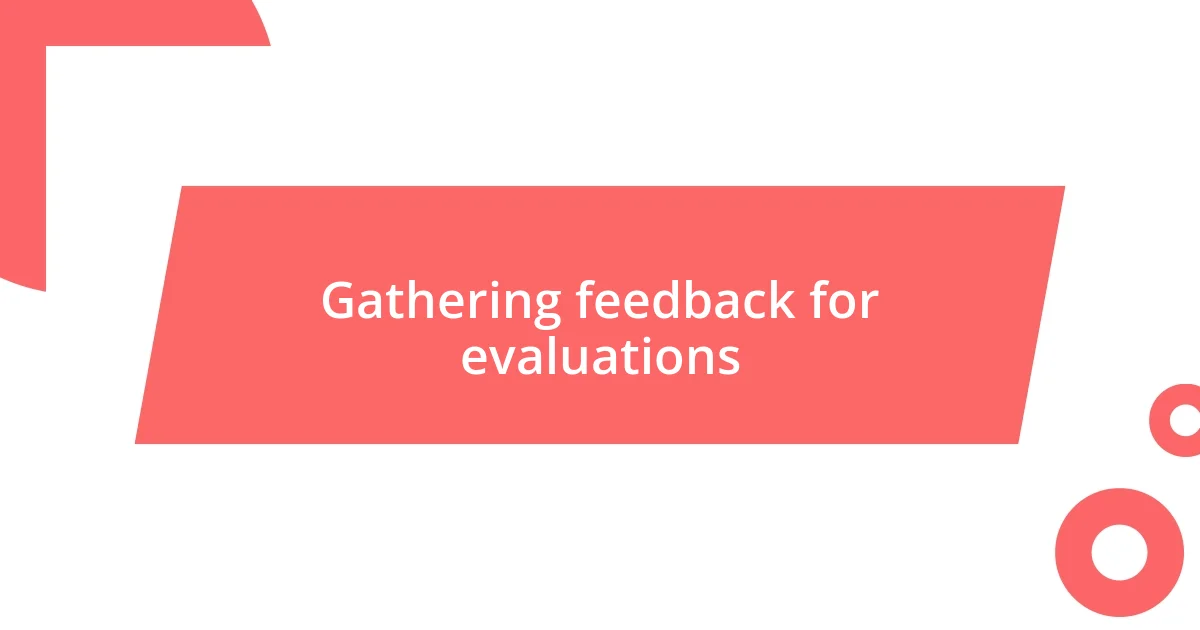
Gathering feedback for evaluations
Gathering feedback for evaluations is a crucial step that I’ve come to value deeply. Early on, I realized that simply waiting for feedback during my annual review wasn’t enough. I made it a habit to actively seek insights from my colleagues and supervisors throughout the year. Not only did this practice give me a clear picture of my strengths and areas for improvement, but it also fostered an open dialogue that made my evaluations much more rewarding.
I’ll never forget a transformative moment when I approached a trusted coworker for feedback on a project we collaborated on. The conversation revealed some blind spots I hadn’t considered, and it truly opened my eyes. It made me ponder: how often do we overlook valuable perspectives by staying in our comfort zones? This kind of honest feedback became my secret weapon, helping me grow and adapt in ways I never anticipated.
Asking for feedback isn’t just about accumulating reviews; it’s about building relationships. I remember discussing my goals and seeking feedback with my manager over coffee rather than in a formal setting. It created a relaxed atmosphere, making it easier to receive constructive criticism. These casual conversations were often more insightful than formal evaluations and helped me feel more motivated. How empowering it is to cultivate an environment where honest feedback flows freely!
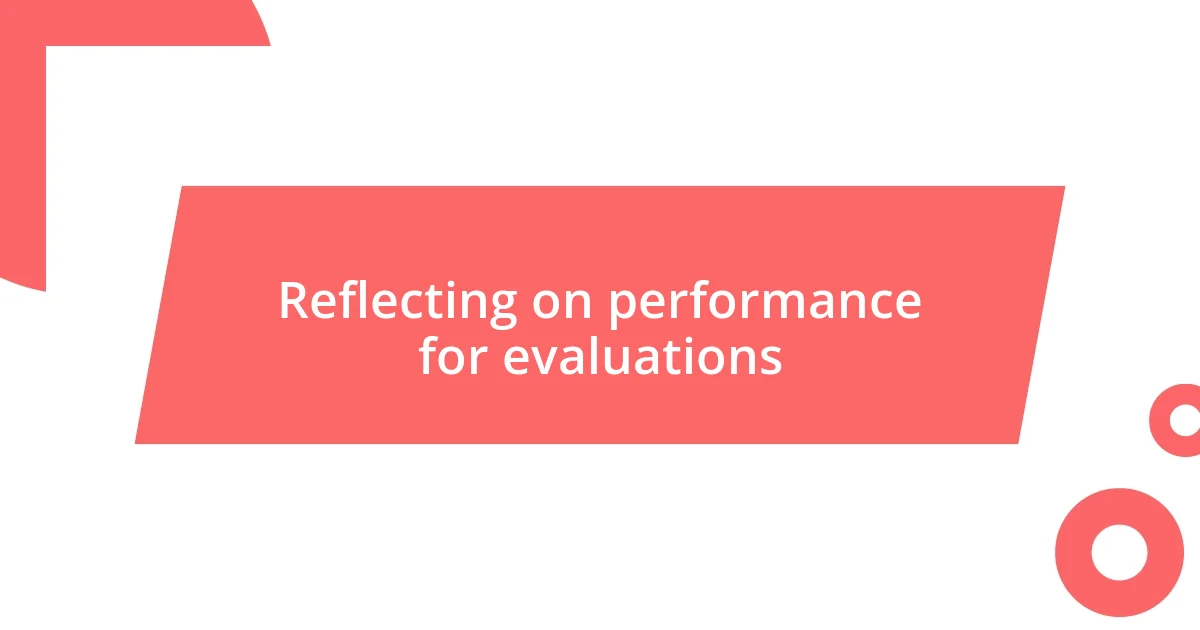
Reflecting on performance for evaluations
Reflecting on my performance is something I’ve learned to embrace, rather than dread. Each year during evaluations, I take time to review my accomplishments and setbacks. Just last year, I sat down with a cup of coffee, opened my notes, and began writing about the projects I completed. It was surprising how clear the trends became—what worked, what didn’t, and how my approach evolved. In that moment, I realized reflection is less about self-criticism and more about discovery.
I also find it crucial to connect my reflections to my overall career goals. For instance, after a particularly challenging project, I noted not just the outcome but also the skills I leveraged and those I wished to improve. This process can be a bit uncomfortable, can’t it? However, I’ve come to see it as a chance to grow, both personally and professionally. Each reflection plays a pivotal role in shaping my next set of goals, making that practice not only beneficial but essential.
Often, the insights I gather during reflection prompt me to reach out for additional guidance. After articulating my performance, I might ask my manager specific questions about their expectations. Recently, after assessing my teamwork on a big project, I approached her with inquiries about how I can better support the team in future projects. Engaging in this dialogue has shown me that reflection isn’t an isolated activity; it’s a springboard for further dialogue that boosts my growth trajectory in invaluable ways.
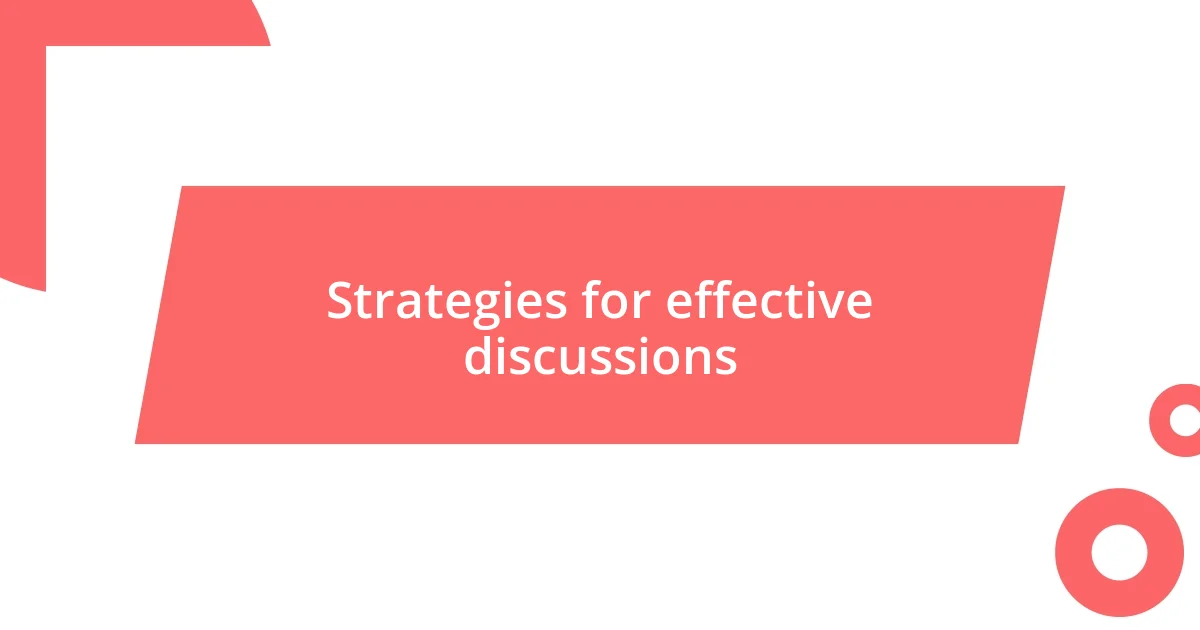
Strategies for effective discussions
When it comes to effective discussions during annual evaluations, I’ve learned that preparation is key. Taking the time to outline my thoughts beforehand not only helps me articulate my points clearly but also eases any anxiety I might feel. I remember a time when I walked into my evaluation unprepared, fumbling over my achievements and ending up focused on negatives. It made me realize how essential it is to enter these conversations with a structured approach.
Active listening plays an equally crucial role in these discussions. I’ve found that approaching evaluations as a two-way dialogue truly enriches the experience. I can recall a past evaluation where my manager shared insights that altered my perspective on my work completely. I made it a point to really absorb their feedback, asking clarifying questions when needed. This engagement not only made me feel valued but transformed the evaluation into a collaborative session rather than a top-down review. How often do we miss golden opportunities simply by not tuning in to the other person?
Finally, it’s important to express gratitude during these discussions. I wish I had realized this sooner! Last year, after my evaluation, I took the extra step of sending a thank-you note to my manager, acknowledging their support and insights. It wasn’t just about politeness; it established a stronger bond and set a positive tone for our future interactions. When was the last time you considered the impact of a simple thank you on your professional relationships? Creating that culture of appreciation makes the evaluation less of a chore and more of a meaningful exchange.
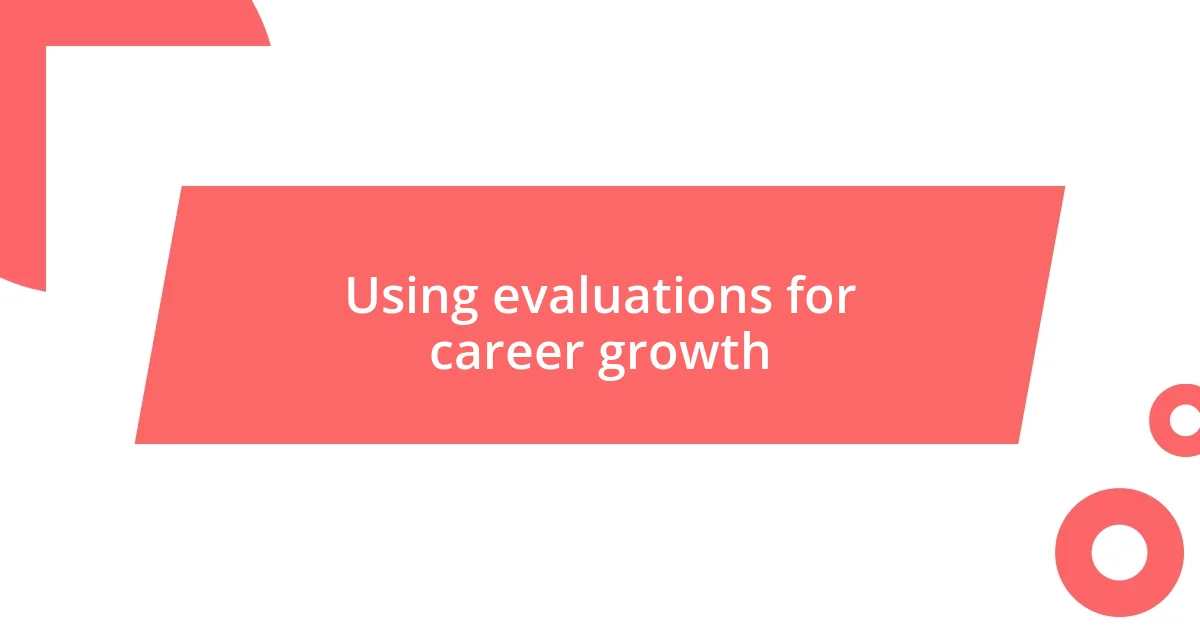
Using evaluations for career growth
Using evaluations as a tool for career growth can be a game changer. Reflecting on feedback has encouraged me to seek out opportunities I might’ve otherwise overlooked. For example, after receiving constructive criticism during one evaluation, I proactively enrolled in a workshop that focused on the skills I wanted to enhance. That simple step not only improved my capabilities but also demonstrated my commitment to growth. Isn’t it empowering to turn feedback into actionable steps?
I’ve found that evaluations can also help me reevaluate my long-term goals. In one instance, after a discussion about my performance, I realized that my current path didn’t align with my aspirations. This reflection led me to actively pursue a role in project management, something I had never considered before. It made me think—how often do we stick to a trajectory without questioning whether it truly fits our vision? Evaluations create the perfect space to challenge our status quo and pivot when necessary.
Moreover, I cherish how feedback from evaluations can illuminate strengths I hadn’t fully recognized. I recall sharing a project I was passionate about, and my manager pointed out leadership qualities in me that I hadn’t tap into yet. That moment was eye-opening. It made me wonder: how much potential are we all sitting on, waiting for someone to help us see it? Embracing this kind of feedback not only boosts one’s self-awareness but also transforms evaluations into stepping stones toward greater achievements.












